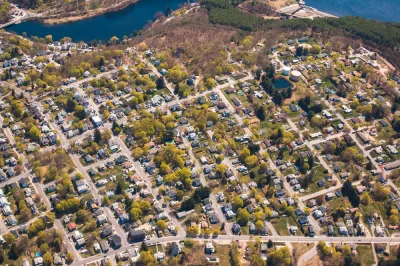A statewide zoning reform bill that made it part of the way through the Massachusetts State Legislature in 2016 is back up for consideration this year.

The state of Massachusetts is working on a comprehensive zoning reform bill that would make the first time since Gerald Ford was president of the United States that the state has overhauled its zoning rules. "In the decades since, restrictive zoning practices in many of the state’s leafier suburbs have hardened into patterns that exclude family housing, mixed-income developments, even modest accessory dwellings such as granny flats," writes Renée Loth, who characterizes the zoning reform effort as a potential salve for the state's affordable housing crisis.
A zoning reform bill sponsored by Acting Senate President Harriette Chandler passed the State Senate in 2016, but it must still be ratified and debated in the current legislative session, according to Loth. The cause of loosening zoning restrictions has support from the Governor's Office as well. In December, Governor Charlie Baker "announced a statewide plan to ease housing construction throughout the approval and development process," according to a Planetizen article sharing that news.
As for the details of this new statewide zoning reform bill, Loth explains:
The zoning reform bill sets new statewide standards allowing for multifamily housing, accessory dwelling units, cluster zoning to preserve open space, and other “smart growth” initiatives. It eases the current statewide requirement of a super-majority vote to change local zoning or to grant special permits. It helps smaller communities plan better through grants and training. And, importantly, it explicitly outlaws “exclusionary land use practices” that discriminate against racial or economic minorities, families, and other protected classes.
The text of the bill that made it through the Senate in 2016, S.2311, is available online.
FULL STORY: Zoning reform offers a path to economic equality and social integration

Montreal Mall to Become 6,000 Housing Units
Place Versailles will be transformed into a mixed-use complex over the next 25 years.

Planetizen Federal Action Tracker
A weekly monitor of how Trump’s orders and actions are impacting planners and planning in America.

DARTSpace Platform Streamlines Dallas TOD Application Process
The Dallas transit agency hopes a shorter permitting timeline will boost transit-oriented development around rail stations.

Interactive Map Reveals America's “Shade Deserts”
Launched by UCLA and American Forests to combat heat-related deaths, the tool maps the shade infrastructure for over 360 U.S. cities.

Bicycles and Books — In Sacramento, Libraries Now Offer Both
Adult library card holders can check out e-bikes and e-trikes for up to one week.

Colorado Landfills Emit as Much Pollution as 1M Cars
Landfills are the third-largest source of methane pollution in Colorado, after agriculture and fossil fuel extraction.
Urban Design for Planners 1: Software Tools
This six-course series explores essential urban design concepts using open source software and equips planners with the tools they need to participate fully in the urban design process.
Planning for Universal Design
Learn the tools for implementing Universal Design in planning regulations.
City of Mt Shasta
City of Camden Redevelopment Agency
City of Astoria
Transportation Research & Education Center (TREC) at Portland State University
US High Speed Rail Association
City of Camden Redevelopment Agency
Municipality of Princeton (NJ)





























